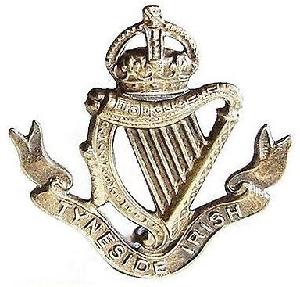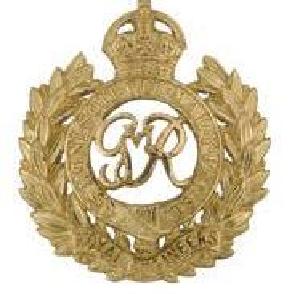
Tyneside Irish Badge

Royal Engineers badge
Mark Bond 1883 – 1919
This is a story of a determined family man who wanted to do his bit for King and Country but was prevented by his physical health. Mark Bond enlisted on two separate occasions to join the war effort. The first time was in 1914 and then again in 1916.
Mark Bond was born in 1883 at Newsham, Blyth Northumberland and was one of five children. His parents were Arthur and Margaret Bond of Coach Road, Bedlington. He married Mary Grace James in 1903 at Bedlington and they had two children, Catherine and James. In 1911, he lived with his family at Walker Terrace, Bedlington and worked in the coal mines as a stoneman.
Mark’s first period in the army was with the Northumberland Fusiliers (Tyneside Irish) 26th Battalion after being passed medically fit to serve at a medical at Blyth Northumberland in December 1914. He was only able to serve for 138 days and was discharged following another medical in April 1915 as being ‘not likely to become and efficient soldier’.
It is not clear what he did after this date but in February 1916 he enlisted again, this time at Bedlington, Northumberland, into the Royal Engineers. He was then in the army reserve from February 1916 until June 1917 when he was mobilised and posted. In September 1917 he was discharged again in as being ‘no longer fit for war services’. His detailed records show he was ‘physically unfit due to a fractured patella sustained 5 years ago in England, in civil life’. Details from the medical reports would indicate Mark would have suffered without taking part in strenuous military activities. It appears that Mark had successfully passed two medicals by concealed his injury and had been liberal with the truth when answering the raft of questions during the enlistment process.
Mark Bond, who the reports describe as being of ‘good character’, was not able to join the rest of his workmates and friends to go off and fight in the Great War. He did not travel to foreign parts and win medals for service in the army or for bravery. What he did do was to try and be part of the war effort and to do his bit. It’s right that Mark’s efforts should be recorded and recognised.
Sadly Mark, who was awarded a partial pension, died at Walker Terrace, Bedlington in 1919, causes not known at this time.
He is remembered in Bedlington on B15.26 page 16

